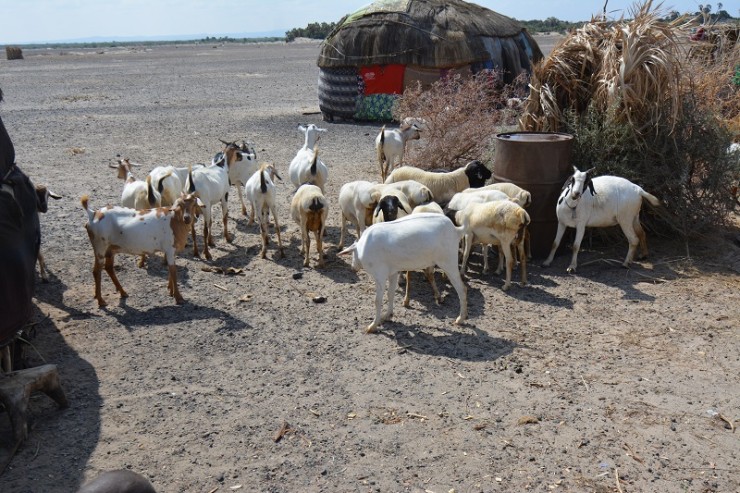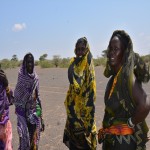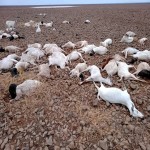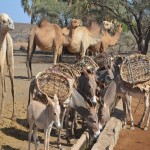
Large-scale humanitarian action urgently needed to avert extreme food insecurity outcomes in
Marsabit County.
The devastating drought gripping Marsabit County has resulted to extreme water shortage, food
insecurity, migration of pastoral communities, widespread reliance on water trucking and food
donations. More than 50% of the households across the County have been hit hard and currently
are at the mercy of well-wishers having lost their livelihoods. Severe food insecurity levels are
likely to surge beyond the emergency and catastrophic proportions if no proactive intervention
measures are put in place. Large-scale humanitarian food assistance coupled with unhindered
humanitarian access is urgently needed to avert severe to extreme food insecurity outcomes in
Marsabit County.
Fig. 2: A pastoralist painfully drugs away one of his hundreds of sheep which has just died as a result of drought
pangs in Demo-Marsabit County
The ravaging drought has prompted pasture and water sources depletion in most parts of the
County leading to massive livestock deaths and migration of all livestock species to neighboring
counties including across
Ethiopia border. The
county has experienced
slightly above normal
livestock mortalities
(cattle 38,628, goats
85,825, sheep 112,879
and camels 34,832). The
depletion of water
sources is also putting
immense pressure on the
few available boreholes and dwindling water pans. Below average household milk availability is
expected to persist as livestock herds remain away from homesteads.
It is against this backdrop that Caritas Marsabit with support from Caritas Italiana, supported
drought affected populations of Demo and Kubi Qoti with food and water support.
BENEFICIARIES SELECTION CRETERIA
Open profiling exercise was conducted to ensure that the most affected and vulnerable sections of
the community benefitted from the aid. This was facilitated through the community meetings. For
the food distribution criteria, beneficiary selection was agreed upon with the community and
village committees constituted and tasked with the responsibility of selecting the most deserving
beneficiaries. While selecting the beneficiary’s names, the community members were strictly
advised to follow the following agreed shared criteria of beneficiary selection but not limited to:
➢ Access to other Social safety net programs. Those without benefits from other sources shall
be given priorities as opposed to those with benefits.
➢ Herd size. The bigger the herd one owns the wealthier one is considered in pastoral
communities. Therefore, those with small herd coupled by no other benefits from
elsewhere compared to those with large herders and have assistance from other sources are
considered for the support.
➢ Household composition. The support basically targets households and therefore the
household size is critical. Number of children under five and elderly persons. Old persons
and under five are most vulnerable persons during drought and hard times. Therefore
household with old persons and under five with no support are given priorities during
selection
➢ Disabilities and terminal illnesses. People with disabilities who has no support are
considered for the assistance.
➢ Income level. People with little income or no income suffers most during drought and hard
times therefore consideration is made to favour them.
➢ Household heads. Those households headed by single mothers or children are given
priority because they are most susceptible to any forms of discrimination and side-lining.
➢ Any other criteria deemed necessary by the local communities provided that it addresses
vulnerability in a bid to bring into par vulnerable persons with other persons in the society.
Figure 1 community meeting and beneficiary’s identification
FOOD DISTRIBUTION
Through this project, 200 severely affected households translating to approximately 1200 persons
in Demo and Kubi Qoti in Marsabit County were reached out. So as to prevent acute malnutrition
and starvation, Caritas Marsabit procured and distributed essential food items to the 200 severely
affected households. The ration size per household per month are as follows;
1. Rice ...................... 25kgs
2. Beans..................... 10kgs
3. Vegetable oil.............. 2 litres
4. Sugar....................... 2kgs
5. Milk........................1carton


